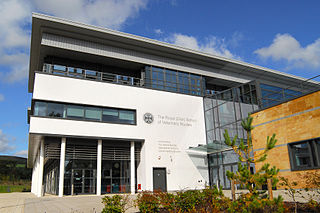
Canine distemper virus (CDV) is a viral disease that affects a wide variety of mammal families, including domestic and wild species of dogs, coyotes, foxes, pandas, wolves, ferrets, skunks, raccoons, and felines, as well as pinnipeds, some primates, and a variety of other species. CDV does not affect humans.

The Leeuwenhoek Lecture is a prize lecture of the Royal Society to recognize achievement in microbiology. The prize was originally given in 1950 and awarded annually, but from 2006 to 2018 was given triennially. From 2018 it will be awarded biennially.
Sir Roy Malcolm Anderson is a leading international authority on the epidemiology and control of infectious diseases. He is the author, with Robert May, of the most highly cited book in this field, entitled Infectious Diseases of Humans: Dynamics and Control. His early work was on the population ecology of infectious agents before focusing on the epidemiology and control of human infections. His published research includes studies of the major viral, bacterial and parasitic infections of humans, wildlife and livestock. This has included major studies on HIV, SARS, foot and mouth disease, bovine tuberculosis, bovine spongiform encephalopathy (BSE), influenza A, antibiotic resistant bacteria, the neglected tropical diseases and most recently COVID-19. Anderson is the author of over 650 peer-reviewed scientific articles with an h-index of 125.

The Royal (Dick) School of Veterinary Studies, commonly referred to as the Dick Vet, is the University of Edinburgh's vet school. It is part of the College of Medicine and Veterinary Medicine.
The University of Liverpool School of Veterinary Science was the first veterinary school in the United Kingdom to be incorporated into a university. The school's teaching, treatment and research facilities are on the main campus and at Leahurst on the Wirral Peninsula, approximately 12 miles outside Liverpool.

Dame Angela Ruth McLean is professor of mathematical biology in the Department of Biology, University of Oxford, and Chief Scientific Adviser to the UK Government.
Fred Brown was a British virologist and molecular biologist.
The Moredun Research Institute is a scientific research institution based at the Pentlands Science Park, in the Bush Estate area of Midlothian, Scotland. It conducts research into diseases of farm livestock and the promotion of animal health and welfare.
Brian Derek Perry, OBE is a British veterinary surgeon and epidemiologist renowned for the integration of veterinary epidemiology and agricultural economics, as a tool for disease control policy and strategy development, and specialised in international agricultural development. He is an Honorary Professor at the University of Edinburgh, a Visiting Professor at the Nuffield Department of Clinical Medicine, University of Oxford.
Prof Henry Dryerre FRSE MRCS LRCP was a Scottish veterinarian and animal physiologist. He was Emeritus Professor of Physiology at the Dick Veterinary College in Edinburgh. The Carnegie Trust for the Universities of Scotland administer a bursary known as the Henry Dryerre Scholarship which is named in his honour. Due to his lineage he is sometimes referred to as Henry Dryerre IV.
Moira Katherine Brigid Whyte FERS is a Scottish physician and medical researcher who is the Sir John Crofton Professor of Respiratory Medicine at the University of Edinburgh. She is the Director the Medical Research Council Centre for Inflammation Research and is Vice-Principal and Head of the College of Medicine and Veterinary Medicine at the University of Edinburgh. Whyte is also a trustee of Cancer Research UK.

John McDougal Russell Greig CBE FRSE MRCVS was a Scottish veterinarian who was Director of the Moredun Research Institute from 1930 to 1954. He is noted for the development of several important animal vaccines: Enzootic abortion in ewes; Braxy and Louping ill. His work on milk effectively created "clean milk" for the first time in Britain.
Rabies takes an economic toll on Tanzania; costs due to rabies include medical expenses, control of infected dogs, and safety inspections in local communities. Rabies medication is also very expensive for the average Tanzanian.

Jonna Ann Keener Mazet is an American epidemiologist and Executive Director of the University of California, Davis One Health Institute. Recognized for her innovative and holistic approach to emerging environmental and global health threats, she is an elected member of the National Academy of Medicine and a fellow of the American Association for the Advancement of Science. Mazet is a professor of Epidemiology and Disease Ecology at the UC Davis School of Veterinary Medicine, where she focuses on global health problem solving, especially for emerging infectious disease and conservation challenges.
Dr Peter Albert Laing Wight FRSE FRCVS FRCPath (1924–1998) was a 20th-century British veterinarian and expert in poultry research.
Anna Louise Meredith is Professor of Conservation Medicine at the University of Edinburgh, where she has previously served as chairperson of zoological conservation medicine at the Royal (Dick) School of Veterinary Studies.
David Argyle BVMS DECVIM-CA (Oncology) FRSE FRSA FRCVS is Head of the College of Medicine and Veterinary Medicine at the University of Edinburgh.
Azra Catherine Hilary Ghani is a British epidemiologist who is a professor of Infectious Disease Epidemiology at Imperial College London. Her research considers the mathematical modelling of infectious diseases, including malaria, bovine spongiform encephalopathy and coronavirus. She has worked with the World Health Organization on their technical strategy for malaria. She is associate director of the MRC Centre for Global Infectious Disease Analysis.

Julie Lydia Fitzpatrick is a Scottish scientist and academic. She is the CEO of Moredun Research Institute and Scotland's part-time Chief Scientific Advisor. She attended Scientific Advisory Group for Emergencies meetings in that role.
Joanne P. Webster is a British epidemiologist who is the Royal Veterinary College Chair in Parasitic Diseases, Director of the Centre for Emerging, Endemic and Exotic Diseases and Professor of Infectious Diseases at Imperial College London. She is a Fellow of the Royal Society of Biology and Fellow of the Academy of Medical Sciences.







